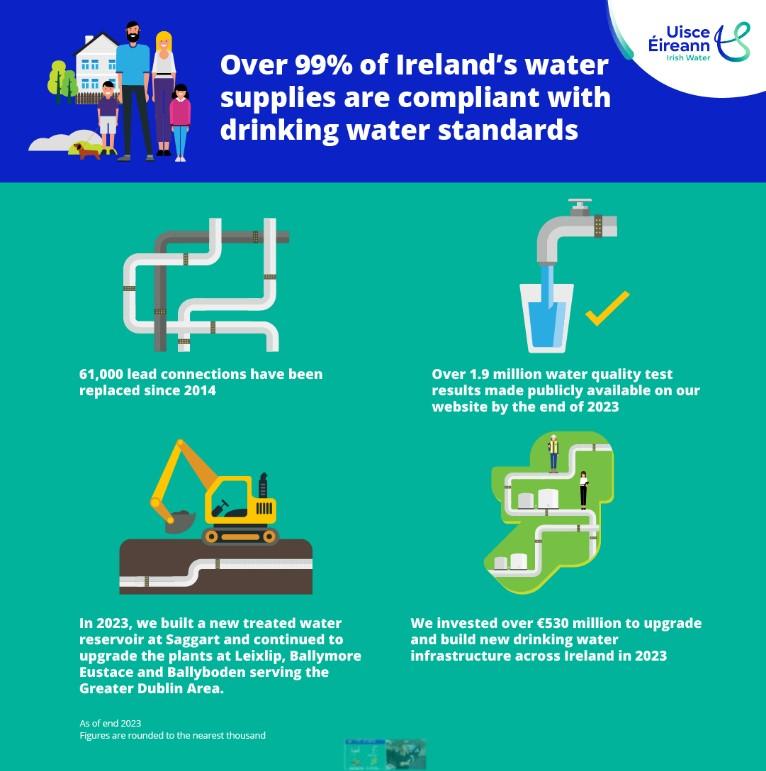The quality of Ireland’s drinking water remains ‘very high’.
The EPA ‘s latest report says 99.7% of samples from public water supplies were compliant with acceptable limits of both chemicals and bacteria.
However the number of people being served by ‘at risk’ water supplies rose again last year to 561 thousand, up from 481 thousand the year before.
While the number of long-term boil water notices rose to 46, almost doubling from 2022 – 8,460 customers on the Carlow North Regional system were affected for three days due to turbidity in March 2023 however an upgrade of the plant is due for completion by the end of this year.
While more than 3,000 in the Clogh/Castlecomer area were hit three times with similar action between December 2022 and the end of February the following year, the boil notice eventually fully lifted in July.
Added to these, works have been completed at Radestown, which serves over 14,000 in Kilkenny City, meaning it’s removal from the remedial action list.
A Court of Justice of the European Union ruling outlined that Ireland had failed to fully implement the Drinking Water Directive in relation to breaches of the 100ug/l limit for Trihalomethanes (THMs) in drinking water supplies. In 2023 the EPA prosecuted Uisce Éireann for failing to control THMs in two supplies, including at Radestown.

Meanwhile, Uisce Éireann in response to the Drinking Water Report says the ‘impressive compliance’ is ‘a result of the ongoing high levels of investment and improved operational measures being implemented by Uisce Éireann’.
The company’s Head of Water Operations Margaret Attridge said; “Uisce Éireann operates over 700 water treatment plants across Ireland and we are committed to delivering transformative water services which enable communities to thrive.”
“The EPA report recognises the ongoing improvements made by Uisce Éireann in testing, monitoring and assessing water supplies and the key role this has played in identifying risks to drinking water quality, and ensuring a safer water supply for all. Where appropriate temporary Boil Water Notices or other restrictions are introduced to protect public health while the problems identified are addressed. Most of the Boil Water Notices imposed in 2023 were in place for less than 30 days.
Uisce Éireann also continues to make progress in addressing known risks to water supplies which are on the EPA’s Remedial Action List. In 2023, 10 more supplies were removed from the list following the completion of remedial actions. For those supplies that remain on the list or for those added, Uisce Éireann is progressing plans to address any underlying issues and ensure resilient water supplies for the communities they serve.”
In 2023 Uisce Éireann invested over €530 million in our water treatment plants and networks across the country, with a number of new water treatment plants built or significantly upgraded and an additional 30 sites enhanced under the National Disinfection Programme.
In 2023 they built or upgraded water treatment infrastructure across the country, including in Callan and Piltown/Fiddown.
Ms Attridge added; “The EPA Drinking Water Report shows that risks to the resilience and security of Ireland’s drinking water supplies continue to be identified and addressed by Uisce Éireann. We have an ambitious capital investment programme, through which we will continue to improve the safety and resilience of Ireland’s drinking water supplies in the years to come.”
“Public health is our top priority; initiatives such as our national disinfection programme, the rollout of the Drinking Water Safety Plan approach, and our enhanced testing and monitoring of treatment plants, have enabled is us to make enormous strides in ensuring more secure and resilient supplies.
“We recognise that challenges remain, and it will take sustained high levels of investment across a number of investment cycles to address all legacy issues, but we are confident that our ambitious capital investment programme will enable us to transform Ireland’s water services and ensure a safe, sustainable, secure and reliable drinking water supply for everyone now and into the future, supporting communities to thrive.”







